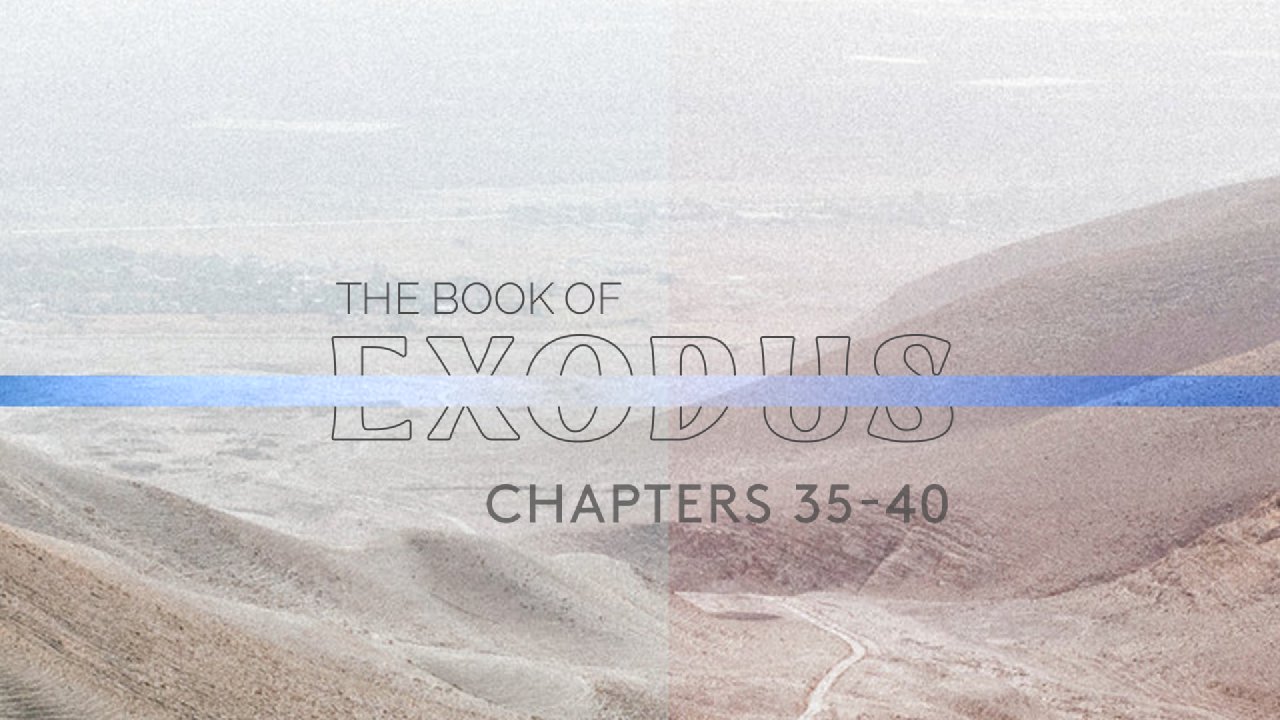Yahweh, a God Merciful and Gracious
November 7, 2021 • Jonathan Parnell
So over the next two Sundays, God willing, we’re going to spend two sermons looking at Exodus 34, and that’s because this chapter is the high-water mark of God’s revelation in the Old Testament. Next week we’re gonna deal more with the Mosaic covenant and what that means for us, but this week we’re going to focus on verses 1–9 as the continuation of what Pastor David Mathis showed us last week in Chapter 33.
And there are a few different ways that I could preface this passage, and I struggled to know exactly what to say, but here’s where I landed, and so I just wanna say this for the sake of honesty and invitation.
Here it is: Our readiness — your readiness — to hear Chapter 34, verses 5–7 depends upon how you heard Chapter 33, verse 18.
Look back again at Chapter 33, verse 18. Moses begs Yahweh, “Please show me your glory.”
And Moses, of course, is saying this in the middle of a high-stakes situation. He has a lot of uncertainty ahead of him. He has reasons to be frustrated and afraid, but he knows that what he needs more than anything in this moment is to see the glory of God, and so he asks for that. Moses is asking God, “Please show me your glory.”
And here’s the thing: if what Moses is asking doesn’t pique your interest — if it doesn’t compel you to lean in and listen up — then Chapter 34 will not matter to you. Because Chapter 34 is God’s answer to Moses’s question … but why would you care about the answer if you don’t care about the question? Right?
We understand how this works. It’s pretty simple. The world is full of answers (and so-called answers) to all kind of different questions. That is what media is, and it’s in our face all day long — more information and messages and answers to all kinds of different questions, but the only answers we care about are to the questions we’re asking — and of all the questions we ask, does anybody want to see the glory of God?
Would any of us echo Moses here and want with him and ask with him of God, “God, please show me your glory”?
Because, if you don’t care about the question you won’t care about the answer. I’m just being honest.
But also — and this is the invitation — maybe you’ve not cared to see the glory of God before, but you can care to see it now.
Maybe you’re here this morning and you’re in a difficult situation and you’re desperate, like Moses was.
Or maybe you’re here and you’re just sick and tired of shallow answers to shallow questions.
Or maybe you’re here and you have a growing desire to just know God, because you realize that all the searchings and longings of your heart are really for him.
See, wherever you’re coming from, this morning you can, and you may, pray with Moses, “God, show me your glory.” And I invite you to do that. This morning I invite all of us to make this the question we’re asking, okay. Because God answers it.
Let’s pray:
Almighty God, Creator of heaven and earth, our Father through Jesus Christ our Lord, this morning with your Word open before us, in dependence upon your Spirit, we ask as humbly and sincerely as we can, please show us your glory. In Jesus’s name, amen.
So the passage is verses 1–9 and there are two parts here that’s gonna serve as the outline for the sermon.
First, in verses 1–7, there is the revelation of God.
Second, in verses 8–9, there is the response of Moses.
So, the revelation of God [up here]; the response of Moses [down here]. We’re starting here [high], verses 1–7, the revelation of God.
The Revelation of God (verses 1–7)
Here’s what’s happening: God is showing his glory to Moses by proclaiming his name.
And we’re going to slow down to see this in verses 5–7, but first, let me remind you about the context again.
THE CONTEXT (VERSES 1–5)
In Chapter 33, verse 18, when Moses asks to see the glory of God, God tells him, basically, Okay. In verse 19, God says to Moses, “I will make all my goodness pass before you and will proclaim before you my name ‘Yahweh.’
So God says he will reveal his glory to Moses through proclamation — in Chapter 33 God says he will do that, and then in Chapter 34 God does it.
In Chapter 34, verses 1–4, God tells Moses to cut two tablets of stone. (Remember the first tablets in Chapter 32, Moses threw them down and broke them because of the golden calf. That symbolized that the covenant had been broken, and I think it’s mentioned here in verse 1 because we’re supposed to still have the sin of the people in the back of our minds.)
So God tells Moses to make two more tablets and come back up to the top of the mountain, which Moses does early the next morning. That’s verse 4. So Moses is by himself, holding the new, blank tablets, back at the top of the mountain. Now look at verse 5:
Yahweh descended in the cloud and stood with him there, and proclaimed the name of Yahweh. [verse 6] Yahweh passed before him and proclaimed Yahweh, Yahweh …
And we can see the connection here back to Chapter 33. God is doing what he said he’d do. His glory is passing by Moses by proclamation. Which means, God is showing his glory by saying something about himself. God is saying his name; he’s saying who he is.
And I wanna highlight this saying piece, this proclamation piece, because God could have done this however he wanted, right? God can do whatever he wants, and yet, he chose proclamation. God chose to reveal himself through words — through sounds that have meaning. That’s what proclamation is.
And get this: sounds that have meaning from thousands of years ago can be translated into new sounds today that have the same meaning. …
Yahweh, Yahweh, El rahum vey-hannun.
Yahweh, Yahweh, a God merciful and gracious.
God proclaimed that about himself. Those are the words that came from the mouth of God about who he is. Look, do we understand that we, right now, we get to hear what Moses heard?
God said these words to Moses, and this is not just a truth about God, but this is God himself telling us his heart. God tells us, first, his nature; and then second, he tells us his actions that flow from his nature.
God’s Nature (verse 6)
Verse 6: “Yahweh passed before him and proclaimed, Yahweh, Yahweh …” —
This is literally Yahweh proclaiming his name, and this is the only time in the entire Bible when the divine name is mentioned twice like this, back to back. It’s meant to get our attention, it’s meant for emphasis, and, I think, this is an echo.
Now there’s a super important connection here we need to see, but it’s going to take some work, okay? So I need you to really track with me. …
Chapter 34, verse 6 is a developed restatement of Chapter 33, verse 19.
You can see the repetition in the text.
In both cases, 33:19 and 34:6, God repeats the proclaiming of his name, and right away, in both cases, he says that he is merciful and gracious.
Now we might have missed that in Chapter 33. Look back at verse 33:19. God says,
I will make all my goodness pass before you and will proclaim before you my name ‘Yahweh.’ And I will be gracious to whom I will be gracious, and will show mercy on whom I will show mercy.
“MERCIFUL AND GRACIOUS”
So you see that? Gracious and mercy in 33:19 is repeated as merciful and gracious in 34:6, and in both cases, God leads with this as the explanation of his name. It’s the first thing he says after he says “Yahweh.”
And so when we read these words repeated in 34:6 we should think back to those same words in 33:19. Grace and mercy. Mercy and grace.
But, why are they stated in a phrase in 33:19?
Why, in 33:19, does God put grace and mercy in the phrase: I will be gracious to whom I will be gracious, and will show mercy on whom I will show mercy?
Why does God do that?
It’s because 33:19 is an echo way back to Exodus Chapter 3, at the burning bush.
So in your minds, back up and remember the scene when Moses encountered the burning bush (this is in Exodus 3, which we looked at in September of 2019).
God tells Moses that he has seen the affliction of Israel and he’s about to rescue them. He’s going to send Moses to lead the rescue, and Moses, of course, is reluctant, but do you remember what Moses says to God?
Moses says if I go to the people of Israel and tell them what you’ve said, they’re going to want to know? Remember?
So Moses says to God: What is your name so I can tell them?
And in Exodus 3, verse 14, God said to Moses, “I am who I am.” Which means, I will be who I will be. That’s how God first told Moses his name. It means that God is absolutely free. There is no other way to define him other than in terms of himself. He is the I am. His name is Yahweh — he will be who he will be and that is that is Chapter 3.
But see now, in Chapter 33, there’s a lot that’s happened since the burning bush … and as Moses looks out at his next assignment, he is desperate to know a little more about what kind of God Yahweh is.
So hear this echo happening in Chapter 33:19. God tells Moses his name again, but this time it’s not “I will be who I will be” but it’s “I will be gracious to whom I will be gracious, and I will show mercy on whom I will show mercy.”
So see, this is the burning bush all over again, but better — because it’s not just that God is free, it’s that God is free to show mercy and grace to whoever he wants, because he in his nature is merciful and gracious. God is telling us more about who he is.
And in 34:6, as God explains his mercy and grace, Moses doesn’t just need to take his sandals off, but he needs to be hid by God in the cleft of the rock, because the glory is too much.
Yahweh, Yahweh, a God merciful and gracious — that is, he is a God who is slow to anger.
“SLOW TO ANGER”
Now it’s fascinating to me that as God elaborates on his being merciful and gracious, he mentions anger right away. He’s going straight for the problem here, because we know by now that God can be angry, right? That’s the issue in Chapter 32.
After the golden calf, God’s wrath burned hot against the people (32:11) and Moses had to deal with that. Moses knows that God can be angry, and so how’s this going to work?
Because this is a stiff-necked people and it’s just a matter of time before they offend again the holiness of God. How will this play out? Is Moses’s mediation between God and the people always going to be Moses just trying to hold off God’s anger? Do you get the problem here? The question is: is God just always angry and Moses is the real difference-maker? Is that what’s going on?
The answer is No. Because God is slow to anger. God’s anger is not like human anger. Human anger tends to be unpredictable and irritable, because we are perturbable creatures. Sometimes with us anger is a mood. [And you know what I’m talking about. Sometimes we can just be grumpy.] But that’s never the case with God. God is never in an angry mood; he’s slow to anger. Which means every moment of his anger is a perfectly calculated righteous response to sin, and he doesn’t have to zap it out like a reflex because he has the capacity to forbear. Do we know the patience of God!
He is a God merciful and gracious, slow to anger — that is, he is a God abounding in steadfast love and faithfulness.
“ABOUNDING IN STEADFAST LOVE AND FAITHFULNESS”
And we can see how this completes the picture: if God is slow in one way, what is, as it were, “natural” to him? If he’s slow to anger, what abounds or gushes or overflows or emanates from him?
Steadfast love and faithfulness.
And we know these words. “Steadfast love” is a good translation, but maybe my favorite way to say it is that this is God’s “never-stopping, never-giving up, unbreaking, always-and-forever love.” That’s what this is.
Just like God’s anger is not unpredictable and arbitrary, the same goes for his love. God means to love who he loves, and he never stops. You can’t stop him. Nothing can stop him. Seriously:
neither death nor life, nor angels nor rulers, nor things present nor things to come, nor powers, not height nor depth, nor anything else in all creation, can stop the love of God. (see Romans 8:38–39)
And if this steadfastness of his love doesn’t assure us enough, he joins it to his faithfulness. It’s steadfast love and faithfulness — which means, he always does what he says he will do. And that is foundational to this relationship, because in terms of the covenant, the only reason Yahweh is still dealing with Israel here is because of what he promised Abraham. Remember that Moses goes there in Chapter 32. Moses says, God, you swore to Abraham! And God confirms it here, Yes, and I keep my promises.
This is who God is. Yahweh, Yahweh, a God merciful and gracious, slow to anger, and abounding in steadfast love and faithfulness.
And because we know who he is, we can know how we will act, because God always acts in harmony with his nature. We see this fact in the pages of Scripture. The prophet Jonah knew this. …
Remember the prophet Jonah did not want to preach in Nineveh. He tries to flee, but God brings him there anyway, dramatically. And Jonah preaches as he’s told; the people repent; God has mercy on them; but then Jonah is angry because he hates Nineveh, and so he finally tells the truth, Jonah Chapter 4, verse 2. He says, This is why I didn’t wanna come to Nineveh! It’s because
I knew that you are a gracious God and merciful, slow to anger and abounding in steadfast love … (Jonah 4:2)
Jonah is quotes Exodus 34:6. This is why Jonah tried to keep God from his enemy — it’s because he knew that God acts in harmony with his nature, and because his nature is mercy and grace, therefore God will forgive.
Forgiveness is the action that flows from the heart of God. Verse 7 takes us there.
God’s Actions (verse 7)
Verse 7 lists four actions, two positive and two negative, and then there’s a timing piece. I’ll mention the timing piece first.
In verse 7, in the first clause, notice the word “for thousands” (or “to the thousandth generation”);
and then in the final clause notice the “to the third and fourth generation.”
Those are two different timeframes that are meant to be juxtaposed. One is to say: a very very long time that basically never ends; and the other is to say: a specifically long time here on this earth.
The idea is that these are not the same. One is a fact because it’s the heart of God; the other is a fact because it’s necessary.
Yahweh keeps (or guards) steadfast love, forgiving iniquity and transgression and sin. This is God’s heart in action.
Yahweh does not clear the guilty (he doesn’t let sin go unpunished), visiting the iniquity on as many generations as it calls for. This is God’s holiness offended, which deserves his righteous response of judgment. Don’t the misimpression that God being merciful means he is some big “anything goes” Teddy bear in the sky.
God is just and therefore he judges sin. His judgment comes at times in this life (which is verse 7), but it will certainly come in the final judgment. Remember the anger of God is a reality. And this creates tension in the text. We have more questions about how this works. But to the question, “Show me your glory!” … God has given his answer:
Yahweh, Yahweh, a God merciful and gracious, slow to anger, and abounding in steadfast love and faithfulness.
This is the glory of God.
This is the proclamation of his name: Yahweh, Yahweh, a God merciful and gracious.
This is the revelation of God
Now what do we do with this? This is the truth about God. What does it mean for us?
Well I think we can learn from the response of Moses.
The Response of Moses (verses 8–9)
Moses responds in two ways: Praise and Petition. And we’re going to start with the last first. That’s verse 9. It’s that Moses prays. He petitions God.
PETITION (VERSE 9)
Remember back in Chapter 32 when Moses petitions God not to destroy Israel, he prayed on the basis on God’s reputation. He didn’t ask for God to forgive Israel; he just asked that God not destroy them. But now look at how he prays, verse 9:
O Lord, please let the Lord go in the midst of us, for it is a stiff-necked people, and pardon our iniquity and our sin, and take us for your inheritance.
Because Moses now knows that God is free to show mercy and grace, he has the confidence to ask for mercy and grace. Because God is merciful and gracious, that is the only way Israel stands a chance. And the same goes for us. I just wanna be super clear about this.
Pastor David Mathis nailed it last week, and I just want to say it again. The only chance we have to receive mercy from God is because God’s mercy is not dependent upon us. That is good news for sinners. It means that maybe you’re here this morning and you’ve done something terrible and you hate yourself for it — well guess what, God can forgive you.
That God shows mercy on whom he will show mercy means that he will show mercy to you regardless of how badly you’ve messed up. His mercy doesn’t depend on you. Yahweh shows mercy because he is merciful.
And so we ask for it. We turn from our sin and we ask God for mercy. Like Moses does here. But verse 8 comes first. Look back at verse 8.
Praise (verse 8)
Right after Moses has seen the glory of God, after he has heard Yahweh proclaim his name, verse 8:
And Moses quickly bowed his head toward the earth and worshiped.
In Chapter 32, Israel as a nation had quickly turned away from God in sin, but here in Chapter 34, Moses, the mediator, quickly turns to God in worship.
Before he asks for anything, before he makes another move, he puts his face on the ground — and the text doesn’t tell us anything he said, just that he worshiped.
This is praise without words. What is there to say? Moses is in awe of the glory of God. Who is a God like this? The prophet Micah will say this later,
Who is a God like you, pardoning iniquity and passing over transgression for the remnant of his inheritance? He does not retain his anger forever, because he delights in steadfast love. (Micah 7:18)
We have to understand that there was no category for a God who forgives. Moses asked to see God’s glory because he wanted to know him more, but what God said to Moses overcame him. It stopped him in his tracks.
You know, when we gather here on Sundays for worship, we sing together. And it’s good and biblical to sing together as worship. I’m glad we do that. But it also would be good and appropriate if we gathered together and didn’t say a word, but just bowed our heads in awe of the glory of God. What if we just stopped for a minute … what if we just stopped and let the truth of the mercy and grace of God just wash over us?
If before anything else Moses would do that, how much more should we who have seen more than Moses?
Brothers and sisters, remember, of all that Moses has seen here, this is God’s back, but we have the cross of Christ.
See, there are details here that Moses does not know. Remember the question of: how does this work? How can God both forgive the guilty but never clear the guilty? How does God forgive sin but also punish sin?
Well, it’s called substitutionary atonement, and God shows us this in the Book of Leviticus, the very next book, but all of this is pointing to our Lord Jesus Christ when he was slain in the stead of sinners.
Jesus dying on the cross was the most vivid display of the glory of God, because there God didn’t proclaim his heart through words, but he demonstrated his heart through the shedding of his Son’s blood. How much, how deep, is God merciful and gracious?
Bearing shame and scoffing rude
In my place condemned He stood
Sealed my pardon with His blood
Praise be to Yahweh, what a Savior!
Do you want to see the glory of God? Look at the cross of Christ!
And yes, we ask for his mercy, we do! — and we worship him! We praise his name! We rejoice in God’s heart that he has made known to us, front and center, in Jesus.
And I want to invite you now to give him thanks.
The Table
That is what this table is about. We come here each week to remember together the death and resurrection of Jesus, and to thank him. And it’s not so much that we say something right now, but it’s that we receive him in awe of who he is. Yahweh, Yahweh, a God merciful and gracious, slow to anger, abounding in steadfast love — receive Jesus. If you trust in him this morning, this meal is for you.
His body is the true bread.
His blood is the true drink.







